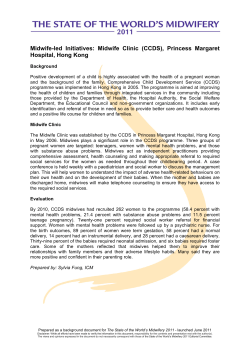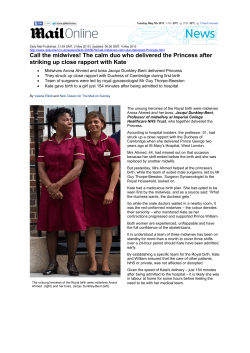
Midwives for Peace
Midwives for Peace in rural Afghanistan Longterm international military engagement in Afghanistan is coming to an end and the transition period leaves the population with uncertainty and severe security challenges. In this situation we can see how civil actors take responsibility in different ways depending on their roles and opportunities. Among them are midwives who have proved to play a role as bridge-builders in local communities. In a situation where security is not sufficiently provided by responsible governmental agencies they have to find ways to cope with security on a day to day basis. This gives them a role and responsibilities that goes beyond their medical profession. Their efforts are made out of necessity to enable them to do their daily work. Sometimes they are not even aware of their vital contribution to human security. Longterm international military engagement in Afghanistan is coming to an end and the transition period leaves the population with uncertainty and severe security challenges. In this situation we can see how civil actors take responsibility in different ways depending on their roles and opportunities. Among them are midwives who have proved to play a role as bridge-builders in local communities. In a situation where security is not sufficiently provided by responsible governmental agencies they have to find ways to cope with security on a day to day basis. This gives them a role and responsibilities that goes beyond their medical profession. Their efforts are made out of necessity to enable them to do their daily work. Sometimes they are not even aware of their vital contribution to human security. To learn more about how midwives deal with security challenges and to support them with capacity building in dialogue and communication skills we had two continuous workshops in Kabul in February and November 2014. The Midwives for Peace workshops gathered midwives from ten districts in Afghanistan; Laghman, Jalalabad, Nurestan, Helmand, Jaghore, Kunar, Khost, Wardak, Kapisa and Kabul. Our findings confirms that midwives play a vital role in local communities. Through the workshops we saw how midwives are empowered and become proud of their achievements when given the opportunity of exchanging experiences from various challenging situations. Being in direct contact with people in a vulnerable and emotional situation, when new babies are to be born, gives them access and opportunities to talk about serious issues. War is a health problem By addressing human security as part of health information and maternity education sensitive issues can be dealt with without being politicized. It becomes natural to talk about destructive consequences of war as something that prevents good health for the population. Stories from the midwives give very concrete examples of how this is done when they express their daily fear of attacks and destruction. Through direct contact with those who conduct violence and their supporters there are examples of how local rebel groups have changed attitudes and behavior. Dr. Khadija introduced education for peace and human rights for midwives. She is the main character in Kristin Solbergs book “Livets skole” Building trust for a peaceful society The stories we have heard shows that building peace is about building trust. Midwives build trust by treating all patients the same irrespective of political affiliations or positions in society. They are in return trusted by providing duties that are very much needed. The midwife profession seems to entail a special status and provide women with broad access to all groups; women and men, as well as people from all communities, including militants. This unique position comes firstly from the uncontested need for the service that midwives provide and secondly from the perception of midwives as independent from governmental structures. Through their work, they have access to the most vulnerable, but also the belligerents and powerbrokers in their communities. Their knowledge and skills is a valuable resource to the whole community. Histories collected in the Midwives for Peace workshops with Afghan rural midwives show that the combination of access and informal power puts them in a unique position to broker deals with belligerents and promote peace in their communities. It is clear that they see themselves as bridge-builders. By strengthening their capacity, these women will be better equipped to use their position to promote a peace that takes womens` needs and experiences into consideration. They are in a position to influence and have the potential to take an active role in their community. How they perform their profession as health workers is of significance as they communicate directly with people who are deeply affected from living with instability and a difficult security situation for a long time. Knowledge and skills from dialogue training is therefore particularly useful for them and can be applied directly. Building trust in conflict prone societies is a prolonged process and requires that there are people who take responsibility to connect people across divides and communicate with all. We have seen that midwives naturally takes this position. There are however other challenges they have to face in conducting their work, and their courage and strength can also make them vulnerable. Midwives are subject to accusations and threats and need supporting mechanisms. From their own experiences they bring up cases where their rights as health workers are abused. Unjust accusations are common and there is a need for reporting and holding health authorities responsible. Other issues are security challenges dealing with local militant groups where midwives in several cases have negotiated access. Based on these experiences we propose a training programme in dialogue, peace and reconciliation for employed women in rural communities, including other professions as teachers and health nurses. A training programme that seeks to provide safe spaces for sharing issues that are most urgent in the life of Afghan women in rural, remote and insecure communities. Becoming more visible as an agent for change is empowering and increases vulnerability at the same time. This dilemma requires a cautious approach in supporting the role they are performing where every person must be acknowledged the right to set their own limits. In order to promote womens` political and economic rights in Afghanistan we believe it is necessary to build on their real life experiences. Generally there are not many opportunities for rural women to share their stories and perspectives and their voices are therefore often neglected. It is possible to reverse this trend by ensuring that female professionals become more aware of their rights and strengthening their capacity for resolving family and local disputes. An investment for a more peaceful future in rural Afghanistan. Norunn Grande, Nansen Center for Peace and Dialogue (NCPD) Lillehammer, March 2015 norunn@peace.no Shirin Gul and Deeva Biabani, photo Norunn Grande Midwives for Peace is based on a recognition of education and health as pillars in development and peacebuilding, highlighting the specific role and potential of midwives as agents for change through peaceful means. Midwives for Peace was initiated by Nansen Center for Peace and Dialogue (NCPD) and Norwegian Afghanistan Committee (NAC). Workshops were held in cooperation with Afghan Midwives Association (AMA), Norwegian Midwife Association (DNJ), Afghan Ministry of Public Health and Swedish Committee for Afghanistan (SCA) Frontpage photo: Midwives at workshop in Kabul, november 2014 www.afghanistan.no www.peace.no Peace Circle at Midwives for Peace workshop in Kabul november 2014, photo Hanifa It was Friday (Shirin Guls story written and translated by Nooruallah Navayee) “It was Friday and I did not have much to do until I saw a woman with a five or six year old child who walked into our clinic. She was wobbling and seemed to be in pain. I looked at her and talked to her, she was pregnant and it was time for her to give birth. I asked her about her male company to help her and care for her, as it is normal in that area that no woman come to the clinic alone. She was very weak, and I saw she needed blood. She said that her male company was on the way and would arrive soon. Her situation was critical and was about to give birth, we tested her blood and made sure that there was some blood in our laboratory, in case her condition was going more serious and her company was not there. She gave birth to a baby girl and we injected some blood to her to help her not go unconscious. I cared for her and her baby, giving her all necessary assistance. She and her baby, after some initial problems, became stable and lively. Her male company arrived after many hours in the late afternoon. He was the woman’s husband’s brother and secretly said that he was a Talib and his brother was in the fighting and that was why he brought his wife to the clinic. He had dropped her by the clinic and taken the four other women who had other medical conditions to the city for check up and treatment. He said that it was a holiday and a good opportunity for them to get out of their village without much checking and disturbance by security forces. situation. She was very grateful for the assistance she had received, and then much dissatisfied with her husband fighting. She said that she would tell her husband to stay home and do his normal work on their family farm instead of using gun and fighting. She said it was much more better to have clinics and doctors nearby instead of destroying everything. - I had a chance to discuss with the woman who had just given birth, about herself and her life (Comments by Noorullah Navayee) The male company of the woman asked me about the security situation in our town, I shared my fears of Taliban’s rocket, one of which had landed a week ago in our neighbor’s yard leaving some physical destruction. He said that he would ask his fellows not to fire any rocket on that town any more. We have not seen rockets coming since that time.” This was one of the stories of a midwife who works in a local basic health clinic. She and other midwives had similar stories, where their midwifery services were a tool to connect to humanity of militants and discuss with them some resolutions necessary for their service provisions. Having access to families in most conservative areas in a very critical moments of life, besides providing health services, some of these midwives apply communication and dialogue skills to help women and families resolve their conflicts, and also they dialogue with men, listening to them and helping them see things differently.
© Copyright 2025









